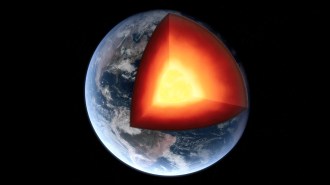Earth & Environment
Toxic consequences of solar power, enduring effects of ancient landslides and more in this week's news
Solar power’s leaden footprint
Plans by China and India to green their electricity generation could leave a very toxic footprint, a new study finds. U.S. researchers identified emissions rates for lead associated with mining, its use in batteries and battery recycling in China and other developing nations. Then the scientists applied those figures to the battery loads needed as energy storage to support the photovoltaic power goals of 1.6 gigawatts for China and 12 gigawatts for India within a decade. Achieving these targets would likely end up releasing almost 2,500 kilotons of lead into the nations’ environments, the researchers report in the September Energy Policy. —Janet Raloff
Ancient landslides a modern peril
As if volcanic eruptions weren’t enough to worry about, scientists now say it’s time to pay attention to volcanic landslides as well. Some 730,000 years ago, a volcano on Tenerife in the Canary Islands erupted, sending a debris avalanche downhill along with the gas and ash. For the next half million years, the presence of this debris pile helped channel the destructive force of later eruptions off to one side of the mountain. Hunting for similar ancient landslides at other volcanoes could improve hazard assessments, scientists from England and Denmark write in a paper published online September 2 in Geology. —Alexandra Witze
Big climate footprint of electronics
Although major household appliances are energy hogs, they typically contribute no more greenhouse gas emissions to the environment than do a family’s electronic equipment, researchers at the Norwegian University of Science and Technology in Trondheim find. Manufacturing electronic products can spew more greenhouse gases than generating the energy to power those devices throughout their lifetimes, the scientists report online August 30 in Environmental Science & Technology. People also replace electronics far more frequently than big appliances. “The rate of acquisition of new TVs and PCs needs to be reduced,” authors Edgar Hertwich and Charlotte Roux conclude. —Janet Raloff







